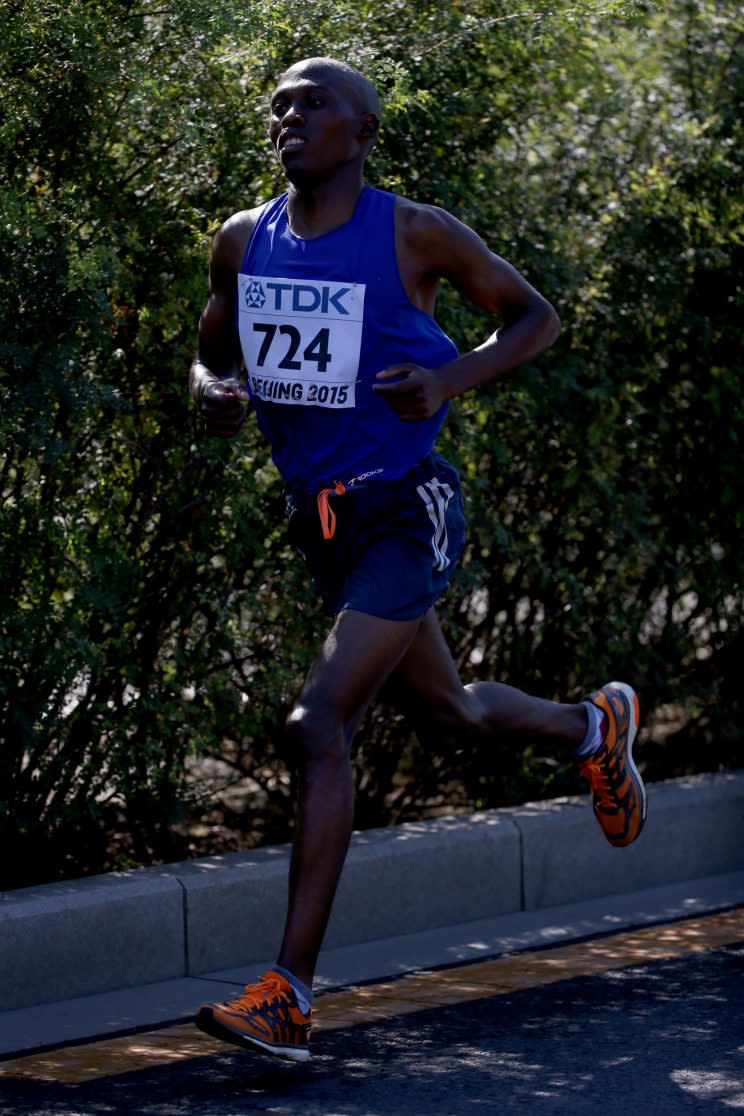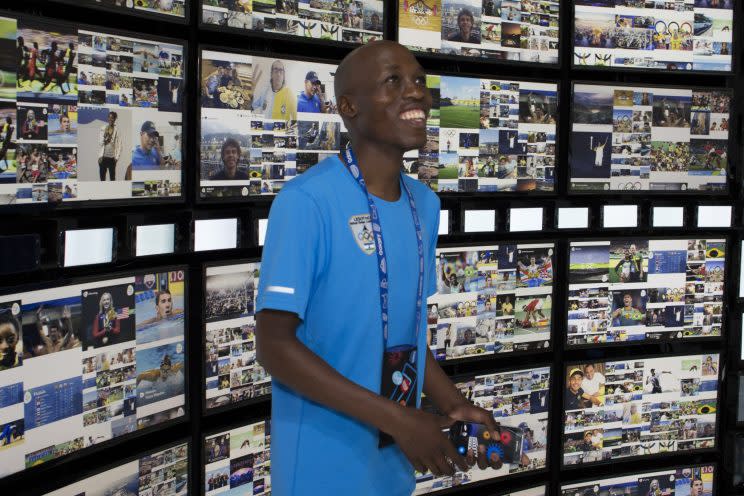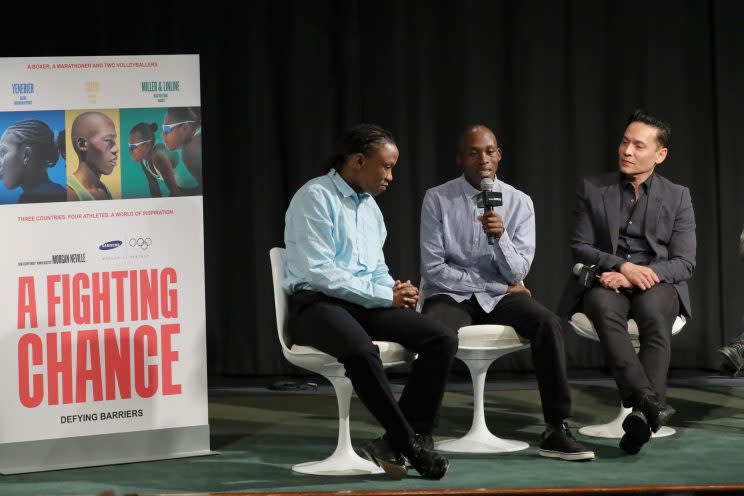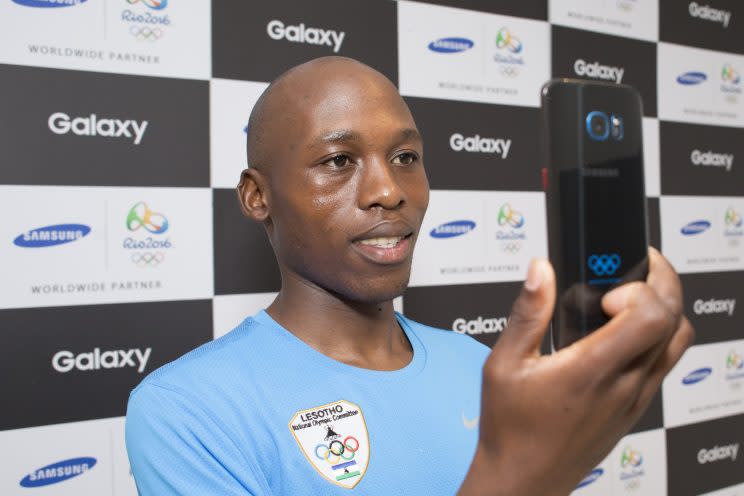Marathoner Tsepo Mathibelle's last-place London finish opens up a world of opportunity


Lucky stars of Rio: Walsh-Jennings, Ross rally for bronze medal | Rollins leads American medal sweep of women’s 100 hurdles | Bartoletta beats out teammate for long jump gold
RIO DE JANEIRO – The man refused to stop. His body wanted to. The tape along the right side of his torso lost its tensile strength a few miles into the race, and that’s when the pain started to leak into him, slowly, steadily, brutally. He had run one marathon in his life before this, and here he was, at the Summer Olympics in London, in front of the world, a bus right behind him for whenever he decided to end the punishment.
A white placard on the back of the vehicle read: SWEEP VEHICLE. It was there for the stragglers. Twenty of the racers succumbed and used it. Everyone figured he would be No. 21. The field long since had separated from him. If he stopped, nobody would blame him.
He couldn’t. On the streets of London, they cheered for him, even when he walked because of the ache that cascaded from the strained muscle. He felt it earlier that week and never received proper treatment and found himself in this position, the people on the bailout bus trailing him futilely. They didn’t realize Tsepo Mathibelle is no ordinary man.
Finally, 2 hours, 55 minutes, 54 seconds after the London Games’ marathon started, Mathibelle staggered across the finish line. Of the 85 runners who finished the race, he was 85th, more than 10 minutes behind the next slowest. His jellied legs carried him to the side, where he bent over and couldn’t shake the feeling of disappointment. He drew no inspiration from it, not that day at least, the day his body wouldn’t let him do the one thing that sustains his life.
“I was sad,” Mathibelle said, “because I wanted to run.”
____________________
It’s three days before the men’s marathon, the last event of the Rio Games, and 25-year-old Tsepo Mathibelle is inside the Galaxy Studio in Olympic Park. A line snakes outside the building, hundreds waiting to strap on VR headsets and dunk waterproof phones into tabletop pools of liquid and experience something so incongruous with the grittiness of the city around it. The entire place is black and white and still somehow manages to feel bright.

Mathibelle is still getting used to such assaults on the senses. He grew up in Lesotho, a tiny kingdom that’s encircled by South Africa. It’s a country of two million people situated a mile above sea level. Nearly a quarter of its residents have HIV. Life expectancy is 42 years. Poverty is endemic. Most residents never leave. If they do, it’s certainly not to travel the world.
And yet that’s what Mathibelle is doing, all because of that day in London. Something about his story stuck with people. Quitting is easy. Mathibelle rejected the idea of it, and from that blossomed a simple question: Why?
For his mom, he says. She was hit by a car and no longer can work. And for his dad, he says. He had a stroke and can’t provide for the family, either. And in Lesotho, where wages are meager, where the diet consists almost exclusively of a thick corn porridge called papa, where the goal is simply to own a home with four walls and a roof, a gift like Mathibelle’s capacity to run is something that must be nurtured and used.
All he ever wanted to do was run. Through the gorgeous green hills of Lesotho, chasing his twin brother, Tsepang, or simply to clear his mind, Mathibelle would kick his legs and pump his arms and propel his body forward, always forward. It guided him through that day in London, when he couldn’t stop, and to Saturday, when he gets to show the world he belongs after all.
“I came here better prepared than ever,” Mathibelle said. “Because last Olympics – there’s a big difference between London and here.”
For one, the meager funding Lesotho provides its Olympic-caliber athletes now has a supplement: Samsung heard Mathibelle’s story, featured him in a documentary about men and women from small countries chasing Olympic dreams and now is sponsoring him and providing the necessary tools for success.
Recently, Mathibelle spent a month in Kenya, where he trained with some of the greatest marathoners in the world. The camp emboldened him. He saw the sport’s apex. He felt like he belonged.
“One day, I’ll be competing with them,” Mathibelle said. “Maybe now.”

____________________
The mystery of bib No. 724 started growing at the 18-mile mark. There were 51 runners left in the international championships for marathon running. Fifty were behind him. The man kept stretching his lead, all the way to 25 seconds, and nobody watching knew who he was because instead of a name printed on the bib there were just numbers.
Tsepo Mathibelle can compete with the best runners in the world, and last August in Beijing he showed it. He held the lead all the way to the 21¾-mile mark, at which point his shoes – meant for shorter distances, with far less cushion than typical marathoning shoes – betrayed his feet. Just short of the 25th mile, Mathibelle had dropped to 11th, and he faded into 14th. The running community nevertheless latched on to him, appreciative of the boldness and audacity with which he ran the race.
“I don’t fear anything now,” Mathibelle said, and it’s a good thing, because the Olympic marathon is nigh and the competition more than ready. Mathibelle still hasn’t broken a time of 2:15 in a race. The medal winners in London all finished below 2:10, and even Mathibelle’s countryman Lebenya Nkoka – one of seven athletes here from Lesotho – posted a 2:12:20 in April.
Today Mathibelle has the right shoes, the right training, the right motivation and the courage to carry his past so it can inform the present. When he ran a 5k or 10k or even a half-marathon barefoot growing up, he didn’t dream of shoes. He wanted to represent his country the right way, and he still does. “I train for the gold,” Mathibelle said.

Maybe he can run the race of his life – though that would mean the London Games’ wasn’t, and that’s hard to displace. It didn’t matter where or when Mathibelle finished.
He finished.
“I just tried to tell myself I want to finish this race, no matter how,” he said. “And I tried to push. Every time I felt that pain, I’d just adjust the pace. I may walk, run, jog. But I kept trying to move to the finish until I got to the finish line.”
It’s there for every race, from 100 meters to 26.2 miles, waiting for the runners to cross it. And it will be there for Tsepo Mathibelle, 85th of 85, No. 724, a man running for his family and his country and himself because it’s all he knows and all he needs.

